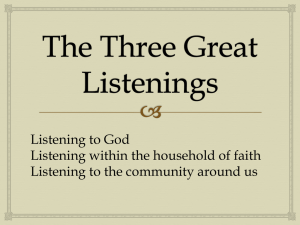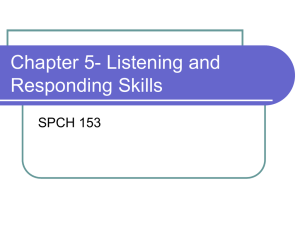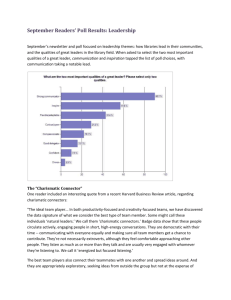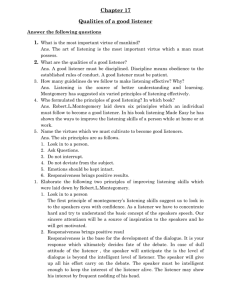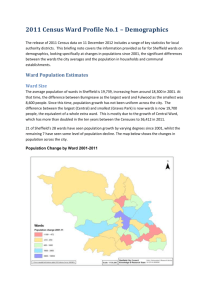The Listening Service – Cefn Coed Hospital
advertisement
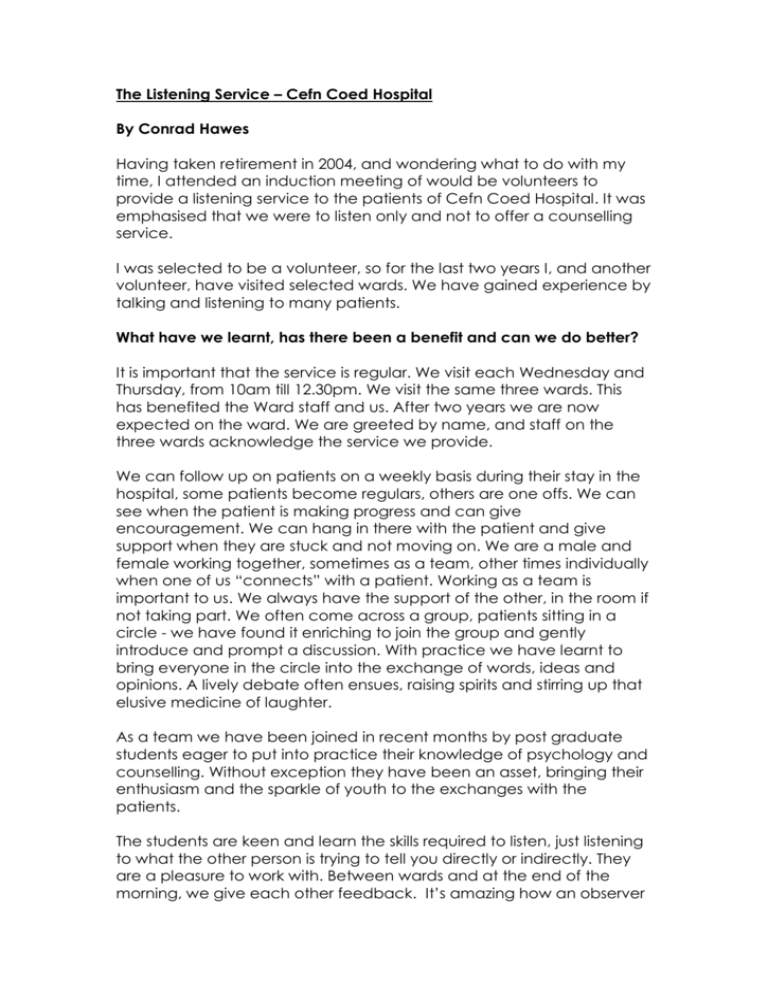
The Listening Service – Cefn Coed Hospital By Conrad Hawes Having taken retirement in 2004, and wondering what to do with my time, I attended an induction meeting of would be volunteers to provide a listening service to the patients of Cefn Coed Hospital. It was emphasised that we were to listen only and not to offer a counselling service. I was selected to be a volunteer, so for the last two years I, and another volunteer, have visited selected wards. We have gained experience by talking and listening to many patients. What have we learnt, has there been a benefit and can we do better? It is important that the service is regular. We visit each Wednesday and Thursday, from 10am till 12.30pm. We visit the same three wards. This has benefited the Ward staff and us. After two years we are now expected on the ward. We are greeted by name, and staff on the three wards acknowledge the service we provide. We can follow up on patients on a weekly basis during their stay in the hospital, some patients become regulars, others are one offs. We can see when the patient is making progress and can give encouragement. We can hang in there with the patient and give support when they are stuck and not moving on. We are a male and female working together, sometimes as a team, other times individually when one of us “connects” with a patient. Working as a team is important to us. We always have the support of the other, in the room if not taking part. We often come across a group, patients sitting in a circle - we have found it enriching to join the group and gently introduce and prompt a discussion. With practice we have learnt to bring everyone in the circle into the exchange of words, ideas and opinions. A lively debate often ensues, raising spirits and stirring up that elusive medicine of laughter. As a team we have been joined in recent months by post graduate students eager to put into practice their knowledge of psychology and counselling. Without exception they have been an asset, bringing their enthusiasm and the sparkle of youth to the exchanges with the patients. The students are keen and learn the skills required to listen, just listening to what the other person is trying to tell you directly or indirectly. They are a pleasure to work with. Between wards and at the end of the morning, we give each other feedback. It’s amazing how an observer can pick up the good and sometimes bad of an exchange, important learning points you would have missed because you were engrossed in the dialogue. Why is the Listening Service beneficial to the patient? One reason is because we are volunteers. We have no authority. We are not Doctors or Managers. We exact no discipline, nursing or social works. We are family. We have no axe to grind, nothing to prove and no targets to meet and we do try hard not to be judgemental. What we are is: free; willing; optional; intent on helping if we can; spontaneous; no pre-conceived ideas;unforced, we don’t have to do it; and we are unpaid. What we do have is a little time to spare for someone who needs to talk. Doctors and staff recognise that when a patient interacts with others and can talk about his situation, he or she becomes part of the healing process, feel they are being heard and become more co-operative to formal treatment and prescribed medication. What do patients talk about? Everything, anything, nothing. It does not matter, getting started is the key. As volunteers we soon learnt to accept some rejection. Not everyone wants to talk to some stranger however well meaning. In fact just being well meaning is a big put off. As a listener you have to continually remind yourself that this is not a good time for the people you are talking to. You need a little humility… ‘there but for the grade of God go I’. One has to be conscious the effect drugs can have on a patient’s ability to think let alone talk. It makes sense to ask staff for an update on any patient you have been previously talking to as you enter the ward. At times listening can mean just sitting there in silence. It can mean making two or three visits before the patient rewards your diligence with a few words. Patients, besides being ill themselves, have to cope with others around them at various stages in their recovery. Hospitals are confining. There have to be timetables and routines to follow. We rarely hear many moans, and in as nice a way as possible explain that we are not there as listeners to take pot shots at the staff or the system. On the other hand we do listen. What do we hear most frequently? “They’ve changed my medication again. “These tablets make me feel awful” ”I’ve been waiting all morning to see the doctor” “My social worker promised to call” “I’m supposed to……but have not heard anything since” (lack of information) We mostly hear: “They are so good to us on this ward” ”They can’t do enough for us” “We have plenty to eat and regular tea breaks” “I’ve had my teeth or feet seen to” “Look how nice they’ve done my hair” “I’m so grateful to be cared for while I am ill” “They go out of their way by doing favours and extras” Patients want to talk about their life on the outside. The circumstances that brought them into hospital. They express concerns about what is facing them when they leave. Accommodation or lack of suitable accommodation causes distress. Relationships, both good and bad are a regular topic. Loss of one’s spouse or partner through divorce, break up or bereavement are quite often a factor in their illness, and affecting their recovery. I find it helpful that I have completed a course on bereavement. Like the rest of us, patients feel threatened by change, usually change they are powerless to do anything about. For example: change of staff; change of medication; change of ward; change of routine; the trauma of admission; apprehension of returning to the outside world. These are things they want to talk to someone about to allay their fears. If you become a listener, be prepared to be entertained by some wonderful, often exotic story telling. It is not our role to question or to query, just allow ourselves to be transported on voyages of discovery, visiting colourful destinations, described in passionate detail with often so much fervour and enthusiasm you can imagine yourself there. I have fought with the S.A.S. in a puppet state in South America. Fought the enemy in Italy in the last major war, survived in a prisoner of war camp. I have heard what it is like to play football for England and rugby for Wales. I have climbed a tall chimney with a steeplejack. I have entered the drug scene, shared the excitement mixed with the cries for help. I have listened…been saddened by someone’s despair…been excited by another’s expression of hope. At times the words flow, like a tap released after being screwed tight for a long time. Released emotions colour the air, anger splits the silence of the room. Sometimes language worthy of a Bard combined with body language, exaggerated movements and the ever changing facial expressions. By listening, you find yourself sharing the experiences of someone who has been abused in some way, let down by society or those closest to the person. The person feeling let down when promises have not been kept. Quite often the biggest problem expressed is guilt. After two years I am convinced listening helps in all these situations. I would like to mention something that happens quite often. I call it “talking faces”. Because of the illness or the effect of drugs, the patient cannot talk. It is tempting to engage in a one sided conversation, or walk away. I have found with patience and sitting face to face, a form of communication can take place. No words are spoken but a sort of recognition takes place. It is a sort of mirroring, matching eye contact, looking serious, smiling, wrinkling the nose, turning up or pouting the lips. Perhaps it is two beings showing mutual empathy in the only way they can. I feel, however silly it seems, that we have reached each other. In the summer, with good weather, we are able to go walking in the hospital grounds with some patients. This is of great benefit, we feel more relaxed and there is more privacy. A little bit of exercise and a break from routine. What have I learnt being a Listener? You have to turn up on a regular basis. You appreciate at first hand the dedicated work done by doctors, nurses, carers, social workers, cleaners and other staff. You learn to be more grateful for your own well being when you work with those who are mentally ill. Listening is enough, you don’t have to be a great talker. Be open minded and prepared for anything. That it is deeply rewarding when someone shares a tear with you, and especially satisfying when you share a moment of happiness, with a smile or laughter. I can’t tell you what it feels like when someone says, “Thank you for coming”. We are still learning and we’d like to say a special thank you to those members of staff on the wards who go out of their way to make us feel welcome on our weekly visits. Having read the above, you may think of some who has the time to become a volunteer listener. Tell them about the Listening Service. It could change their lives.




